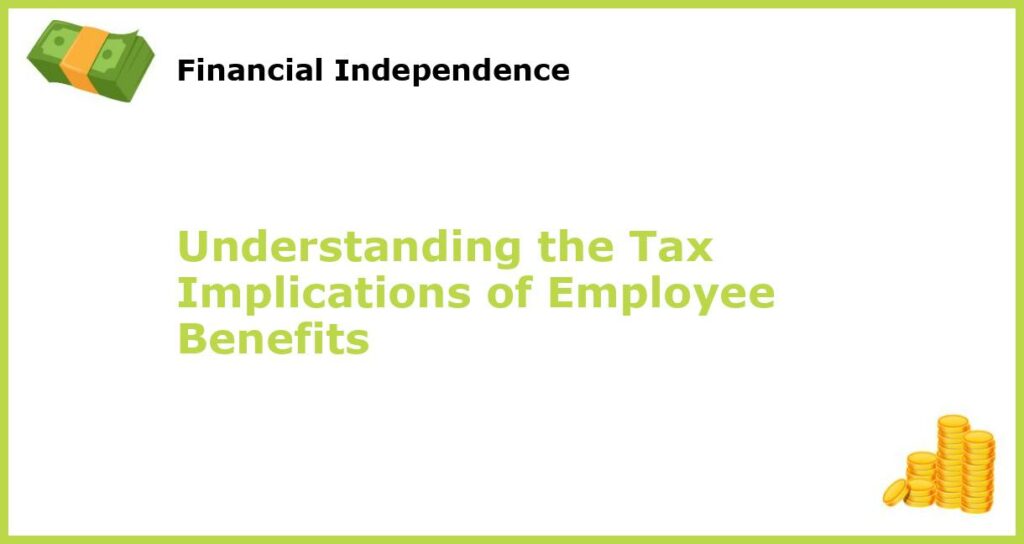Employee benefits are a great perk that many companies often offer to their employees. Employee benefits are a form of compensation that is provided by an employer to an employee in addition to their regular salary or wages. These benefits can vary depending on the employer, and can include things like health insurance, retirement plans, paid time off, and more. These benefits have become increasingly popular over the years, as they are designed to attract and retain employees. However, what many employees and employers may not realize is that these benefits also have some important tax implications that they need to be aware of.
1. What are Employee Benefits?

As mentioned above, employee benefits are a form of compensation provided by an employer to their employees, in addition to their regular salary or wages. These benefits are designed to attract and retain employees, and can include things like health insurance, retirement plans, paid time off, and more. These benefits can vary depending on the employer, and can be offered as part of a package or as individual benefits.
Employee benefits can be an excellent way to keep employees motivated and engaged, and can help to improve retention rates. When employees feel valued, they are more likely to stay with their employer for a longer period of time. Additionally, employee benefits can have a positive impact on the overall morale of the workforce.
However, it is essential to keep in mind that employee benefits also have tax implications, which we will explore further in the following paragraphs.
2. Taxable vs. Non-Taxable Employee Benefits

It’s important to know that not all employee benefits are treated the same under the tax code. Some benefits, like health insurance and certain retirement plans, are considered non-taxable and are not subject to income or payroll taxes. This means that both the employer and the employee can avoid paying taxes on these benefits.
On the other hand, other benefits, like bonuses or stock options, may be subject to income and payroll taxes. The tax implications of these benefits will depend on various factors like the type of benefit, the income of the employee, and the type of company.
It is essential to understand the tax implications of each benefit, as it can impact the overall value of the benefit.
3. The Importance of Proper Documentation

When it comes to employee benefits, proper documentation is critical. Employers must accurately document which benefits are provided to employees, as well as their value and tax implications. This information can help to ensure that both the employer and the employee fulfill their tax obligations and reduce the risk of legal or financial consequences.
Additionally, proper documentation can help to address any questions that may arise about employee benefits, and can be used to verify that employees have been offered the benefits that they are entitled to.
4. How Employee Benefits Impact Payroll Taxes

Employee benefits can impact payroll taxes in several ways. For example, if an employer provides non-taxable benefits like health insurance, the value of those benefits is not subject to payroll taxes. This means that both the employer and the employee can avoid paying payroll taxes on the value of the benefit.
On the other hand, if an employee receives taxable benefits like bonuses, those amounts must be included in the employee’s taxable wages, and both the employee and employer must pay payroll taxes on that amount. This means that the cost of the benefit to the employer is higher than the cost of a non-taxable benefit.
5. Retirement Plans and Tax Implications

Retirement plans are a common form of employee benefits, and they also have important tax implications. Contributions to certain retirement plans, like 401(k) plans, are tax-deductible for employers, meaning they can reduce their taxable income.
Retirement plan contributions are also tax-free for employees until they withdraw the funds, usually after retirement age. However, if an employee withdraws funds before retirement, they will be required to pay income taxes on the amount withdrawn, as well as an additional penalty tax.
6. Stock Options and Taxes

Stock options are a popular form of employee compensation, especially in the tech industry. However, the tax implications of stock options can be complex. In general, stock options are considered taxable when they are exercised, meaning the employee must pay income taxes on the value of the stock at that time.
If the employee holds onto the stock for at least one year before selling it, they may be eligible for capital gains tax rates, which are generally lower than income tax rates. However, if the employee sells the stock within a year of exercising the option, they will be required to pay income taxes at their ordinary income tax rate.
7. Fringe Benefits and Taxes
Fringe benefits are another type of employee benefit that can have tax implications. Fringe benefits include things like company cars, gym memberships, and education assistance. Many fringe benefits are tax-free for the employee, but the value of some benefits may be considered taxable income and subject to income and payroll taxes.
8. The Role of HR and Tax Experts
Managing the tax implications of employee benefits can be challenging, especially for small businesses. However, HR professionals and tax experts can help. HR professionals can ensure that benefits are properly documented and communicated to employees, while tax experts can help employers navigate the complex tax code and reduce their tax liabilities.
By working with HR professionals and tax experts, employers can ensure they are providing valuable benefits to their employees while also minimizing their tax liabilities.
9. Compliance and Legal Considerations
Complying with tax laws and regulations is critical for both employers and employees. Failure to comply can result in legal and financial consequences. Employers should work with tax experts and HR professionals to ensure compliance and mitigate their risk of legal or financial consequences.
Employees should also ensure that they understand the tax implications of any benefits they receive and that they fulfill their tax obligations. Failure to do so may result in the employee owing additional taxes or facing penalties.
10. Conclusion: Understanding the Tax Implications of Employee Benefits
Employee benefits can have important tax implications that both employers and employees need to understand. Proper documentation and compliance with tax laws and regulations are critical for reducing legal and financial risks.
Employers should work with HR professionals and tax experts to ensure they are providing valuable benefits to their employees while also minimizing their tax liabilities. Employees should make sure they understand the tax implications of the benefits they receive and fulfill their tax obligations to avoid any legal or financial consequences.







